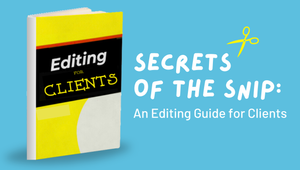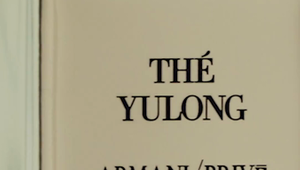
Producing Tomorrow’s Producers: Lindsay Bane on Humanity that Can't be Replaced

Consulate producer Lindsay Bane has been making films and other experimental works for the past couple of decades. Formally trained at NYU’s Tisch School of the Arts, she received an MFA in film production in 2012 and went on to produce commercial content with NY-based agency TAG Creative and Barbara Kopple’s documentary film company, Cabin Creek Films.
She joined the Consulate team in 2021, working alongside senior editors Ryan McCally and Holle Singer, continuing a focus on commercial and documentary film in a post-producer role. Select project credits including the feature documentary “Sugar Babies,” premiering at the 2025 Sundance Film Festival.
Naturally a cat-person from the East Coast, she’s currently in her beagle-mum era residing in Phoenix, Arizona and occasionally teaches film courses at Arizona State University.
LBB> What advice would you give to any aspiring producers or content creators hoping to make the jump into production?
Lindsay> Pursue projects you feel called to and invest your time in the content you want to see in the world. Likewise, collaborate with people you believe in and enjoy working with. Producing is so much about the relationships you build, and remaining authentic in that process will yield a better product that you’ll be happy to stand behind.
LBB> What skills or emerging areas would you advise aspiring producers to learn about and educate themselves about?
Lindsay> It’s important to stay current with evolving technologies, but I would also encourage aspiring producers to keep a firm interest in “soft skills” and the systems that support best communication practices. Because no matter how technology advances, the human aspect of connecting with one another is a consistent key element to collaboration.
LBB> What was the biggest lesson you learned when you were starting out in production - and why has that stayed with you?
Lindsay> The lessons keep coming. An important lesson I learned in the very beginning was not to make assumptions.
When you’re starting out, there’s a lot of stuff that you think other people might already know, and it might reveal a weakness to ask dumb questions. It’s always better to ask questions, be curious, and be proactive in finding out how you can be helpful. This one sticks because I end up with this reminder whenever I make an assumption. It’s okay to not know things. Ask questions and keep learning.
LBB> When it comes to broadening access to production and improving diversity and inclusion what are your team doing to address this?
Lindsay> Consulate is a very diverse team, and it’s always felt like an inclusive and safe environment to me. There’s diverse representation from the top down, and the team seems to reflect inclusivity values in our day-to-day interactions. It cultivates and maintains diversity as a norm.
LBB> And why is it an important issue for the production community to address?
Lindsay> It’s critical to have all people represented in the media we create. Amplifying marginalised voices and bringing them into the production process could be one of this industry’s superpowers. It’s been a hegemonic space for too long, and I think the production community understands there’s an urgent need for this to shift.
LBB> There are young people getting into production who maybe don’t see the line between professional production and the creator economy, and that may well also be the shape of things to come. What are your thoughts about that? Is there a tension between more formalised production and the ‘creator economy’ or do the two feed into each other?
Lindsay> Is the leap between ‘creator economy’ and ‘professional production’ a little like the transition we experienced between radio and film? Or film to TV? Or TV to streaming networks? Yes, these mediums coexist and feed into each other. It’s really something to celebrate, as is the way we continue to evolve and become more accessible and interactive.
The space between creator economy and professional production has something to teach us all and I think we need to stay open-minded as this unfolds and brings more people with new ideas to the conversation.
LBB> If you compare your role to the role of the heads of TV/heads of production/ Exec Producers when you first joined the industry, what do you think are the most striking or interesting changes (and what surprising things have stayed the same?)
Lindsay> Now, my team often delivers hundreds of different files at the end of the job because of all the platforms and the newer ways our work is now consumed. In the past, the delivery may have been a handful of files. This definitely adds more time to the process and extends the delivery schedule. How much of that will be managed by AI in the future?
I also think it’s odd that we are still so reliant on hard drives and imagine a future where they would be irrelevant.
LBB> When it comes to educating producers how does your agency like to approach this?
Lindsay> I’m always learning from my colleagues. I think that's the Consulate's approach, too. We stay connected, talk, share best practices, and lift one another up to a high bar professionally. As far as formal training, Consulate staff attended a professional conference this year, and I think that was useful for tapping into resources beyond our reach—essential for learning what you don’t know you don’t know.
LBB> It seems that there’s an emphasis on speed and volume when it comes to content - but to where is the space for up and coming producers to learn about (and learn to appreciate) craft?
Lindsay> “The Life so Short, The Craft So Long to Learn” … it’s a lifelong education, and now the knowledge is available literally at our fingertips anytime we want to pursue it. It’s easy to tap into the Criterion channel and watch and study the classics.
There are a lot of online resources (MasterClass), but books will always be essential (Tarkovsky’s ‘Sculpting in Time’). I’ve spent a lot of time in film classrooms; there’s a magic there that can really spark our understanding of craft. With people’s busy lives and limited budgets, they have the option to enroll in a course here or there, which might be a more practical and paced approach.
LBB> On the other side of the equation, what’s the key to retaining expertise and helping people who have been working in production for decades to develop new skills?
Lindsay> Integrating different generations into a team is a strength. Invite people to bring their unique skills and experiences to the table; good leadership will recognise it. If someone needs help developing new skills, give them the support they need. Maybe it’s tech support or a class; maybe it’s patience while they take time to develop that new muscle. People adapt, but encouragement goes a long way in that process. A team can build confidence and approach new skills together.
LBB> Clearly there is so much change, but what are the personality traits and skills that will always be in demand from producers?
Lindsay> Kindness is always #1. Producers can set an entire project’s tone in their choice of words, in the way that they connect with the team, in their actions, and in maintaining a general generosity of spirit.
Take a sincere interest in how each individual on the team is doing, and be available to listen or offer support. Producers don’t always have answers, but I think they are experts in finding answers, and they do that best in the calm environment they establish.
I’m always excited to meet another producer who values this, too; those are the folks I love working with because we can make amazing things together while keeping a sense of humour and bringing ease into the workspace.
That’s the humanity that AI can’t replace.















